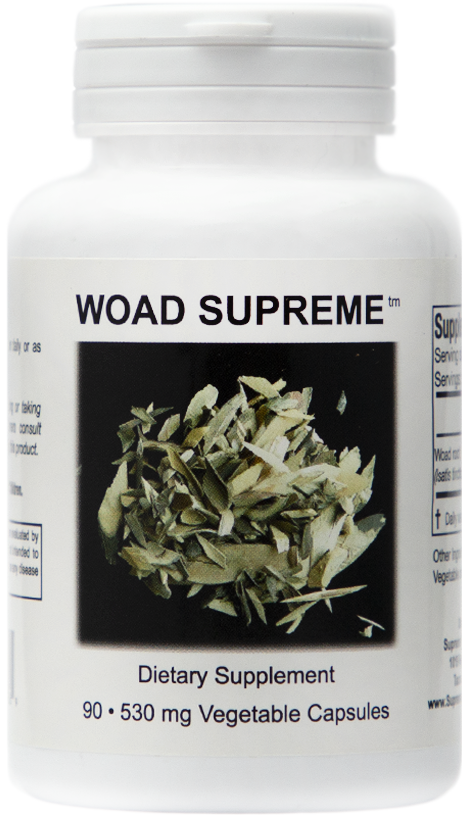
Woad Supreme™ is the powdered root of Isatis tinctoria. Isatis has a history of use in China for 2,000+ years. Isatis, commonly known as woad, has the following indications:
1) It is a broad spectrum antimicrobial. We find it most effective as an antiviral for both acute (including severe respiratory conditions) and chronic problems (1). Many studies have shown it be effective against influenza (the flu) (2). It has also been shown to have antibacterial and anti-parasitic effects, including against leptospirosis (3). It is also immune-stimulatory (4). In China, woad is used to treat such conditions as pneumonia, UTI, sinusitis, tonsillitis, influenza and even acute hepatitis (5, 6). They also brew it into a tea to use topically on rosacea, herpes, shingles, and impetigo.
2) Woad is strongly inhibitory against the COX-2 enzyme thus exhibiting strong anti-inflammatory activity (7). In addition to inhibiting COX-2 and 5-LOX, Isatis reduced allergic airway inflammation and airway hyper responsiveness by inhibiting the production of the Th2 cytokines IL-4 and IL-5, and RANTES (8).
3) In China it has been found to be useful in helping some cancer patients, especially those with leukemia (it is obviously not a stand-alone cancer treatment) (9).
4) Animals studies suggest it has protective effects against certain forms of radiation, especially mucosal damage, and may be a good detoxifier in general (10).
Supreme Nutrition attempts to supply the physician with a large array of broad spectrum antimicrobials with long histories of use in different cultures. Isatis is an excellent addition to this list and should be considered in any patient with subclinical or overt infection. It should especially be considered on patients with viral/flu symptoms.
Contraindications:
1) Do not use if patient is on prescription blood thinners.
2) Safety during breastfeeding and pregnancy has not been studied so you may want to avoid prescribing it during these times.
Dosage:
1-2 caps, 3x/day
1. Wang, X., Jia, W., Zhao, A., & Wang, X. (2006). Anti‐influenza agents from plants and traditional Chinese medicine. Phytotherapy Research, 20(5), 335-341.
2. Yang, Z., Wang, Y., Zheng, Z., Zhao, S., Zhao, J., Lin, Q., ... & Zhong, N. (2013). Antiviral activity of Isatis indigotica root-derived clemastanin B against human and avian influenza A and B viruses in vitro. International journal of molecular medicine, 31(4), 867-873.
3. Hua, J. Y. (1998). 7.4 Heat-Clearing and Detoxicating Herbs. Chinese Materia Medica: Chemistry, Pharmacology and Applications, 173.
4. Yuan, C., Li, D., Chen, W., Sun, F., Wu, G., Gong, Y., ... & Han, X. (2007). Administration of a herbal immunoregulation mixture enhances some immune parameters in carp (Cyprinus carpio). Fish Physiology and Biochemistry, 33(2), 93-101.
5. Li, T., & Peng, T. (2013). Traditional Chinese herbal medicine as a source of molecules with antiviral activity. Antiviral research, 97(1), 1-9.
6. Han, J., Jiang, X., & Zhang, L. (2011). Optimisation of extraction conditions for polysaccharides from the roots of Isatis tinctoria L. by response surface methodology and their in vitro free radicals scavenging activities and effects on IL-4 and IFN-γ mRNA expression in chicken lymphocytes. Carbohydrate Polymers, 86(3), 1320-1326.
7. Danz, H., Stoyanova, S., Wippich, P., Brattström, A., & Hamburger, M. (2001). Identification and isolation of the cyclooxygenase-2 inhibitory principle in Isatis tinctoria. Planta medica, 67(5), 411-416.
8. Brattström, A., Schapowal, A., Kamal, M. A., Maillet, I., Ryffel, B., & Moser, R. (2010). The plant extract Isatis tinctoria L. extract (ITE) inhibits allergen-induced airway inflammation and hyperreactivity in mice. Phytomedicine, 17(8), 551-556.
9. Huaxin, H., Danrong, L., & Changyuan, W. (2002). The reverse roles of unsaturated fatty acids from Isatis tinctoria L on human multidrug-resistant hepatocellular carcinoma cell BEL-7404/ADM [J]. Chinese Journal of Modern Applied Pharmacy, 5, 000.
10. You, W. C., Hsieh, C. C., & Huang, J. T. (2009). Effect of extracts from indigowood root (Isatis indigotica Fort.) on immune responses in radiation-induced mucositis. The Journal of Alternative and Complementary Medicine, 15(7), 771-778.
